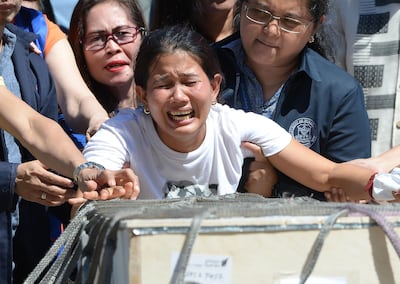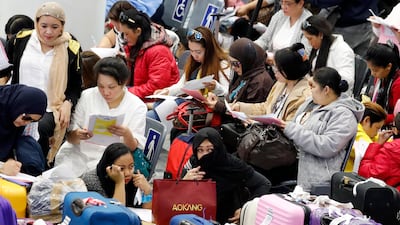Kuwait and the Philippines have reached an agreement to lift a ban imposed by the Gulf state on receiving workers from the East Asian country and to resume issuing tourist and work visas for Filipinos.
The move follows a year-long diplomatic crisis over labour rights.
The latest agreement allows only the recruitment of experienced domestic workers and those who have previously worked abroad.
Kuwait suspended all new visas for citizens of the Philippines last year after relations soured over the murder of domestic worker Jullebee Ranara. After her death, the Philippines prevented first-time workers, especially domestic helpers, from being sent to Kuwait.
The latest bilateral agreement was announced on Monday by Sheikh Fahad Yusuf Al Sabah, First Deputy Prime Minister, Defence Minister and Interior Minister, after meeting Bernard Olalia, Administrator of the Philippine Overseas Employment Administration (Poea) to resolve the issue.
“The two sides agreed to establish a joint technical working committee consisting of competent authorities from the two countries to meet periodically to address employment-related issues and other concerns that may arise in the future,” an Interior Ministry statement said.
In a statement to The National, the Philippines embassy in Kuwait said it welcomed the lifting of the visa ban on Filipino citizens.

“The embassy looks forward to the enhancement of the bilateral relationship between the two friendly countries with forthcoming meetings and discussions that will take up and address the outstanding labour issues and concerns to the satisfaction of both parties and to the mutual benefit of workers and employers,” ambassador Jose A. Cabrera III said.
The Philippines and Kuwait signed a labour agreement to regulate domestic workers in 2018, when a dispute between the two countries led to a two-month diplomatic crisis after the murder of another domestic worker, Joanna Demafelis, whose body was found in a freezer.
In February last year, the Philippines imposed a ban on sending first-time domestic workers to Kuwait in protest over the murder of Ms Ranara after her body was found burnt in the desert. An autopsy conducted by Kuwaiti authorities also found she had been pregnant at the time of her death. The 17-year-old son of her employer was sentenced to 16 years in jail, as a minor.
Ms Ranara's murder came nearly five years after the killing of Joanna Demafelis, the Filipino domestic worker whose body was found in a freezer after she was killed by her employers.
It sparked a diplomatic rift and led then-president Rodrigo Duterte to impose a temporary ban on workers from the Philippines moving to the Gulf country.
Both murders prompted the Philippines' government to review the 2018 agreement.
In 2018, Kuwait said two Filipino embassy staff who appeared in viral videos “rescuing” Filipina domestic workers “were enticing female housemaids of the same nationality to escape from their employers’ households”.
At the time, the review of the agreement angered the Kuwaiti government, which told their Filipino counterparts to “respect its sovereignty”.
Kuwait then listed nine actions by the Philippines embassy it said were in breach of the bilateral labour agreement, including accommodating workers in a private residence or a shelter linked to the embassy.
There are about 270,000 Filipinos in Kuwait, many of them working as domestic helpers. They represent 7 per cent of the total Overseas Filipino Workers (OFW) abroad, most of whom work in Gulf Arab countries such as the UAE and Saudi Arabia.
Of the estimated 1.96 million OFWs in 2022, 1.13 million (57.8 per cent) were female, according to the Philippines Statistics Authority.
According to the Philippine Central Bank, personal remittances from Filipinos abroad reached an all-time high last year due to increasing numbers of overseas workers. Data from the central bank showed personal remittances from overseas Filipino workers amounted to $37.2 billion in 2023, up by 3 per cent from the $36.1 billion in 2022.


